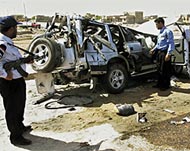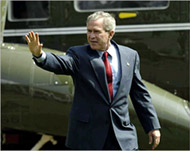Media accused of Iraq bias
During the US siege of the Iraqi town of Falluja in April, a journalist reporting from the city claimed the international media was telling the world the wrong story.

American occupation forces said they had entered the town to flush out a small number of “Saddam loyalists” and “terrorists” after four US security contractors were killed and mutilated.
But Rahul Mahajan, an anti-war activist who was one of the few independent reporters inside the battered city, rejected the official version of events which the world’s media was reporting as fact.
The truth is rather different, he said. The Falluja resistance was not a small group of isolated “extremists” repudiated by the majority of the town’s population.
Rather, Falluja had been in revolt against occupation since last year when US troops opened fire on a group of 100 to 200 peaceful protesters, killing 15.
Like other independent journalists and media professionals, Mahajan says many of the big western broadcasters and newspapers are failing to tell the world what is really happening in Iraq.
They allege that major media players, such as CNN and the BBC, rely too heavily on official occupation authority sources at the expense of Iraqi opinion.
So much so that the line between objective journalism and partiality is often blurred.
Iraq reports
Opponents of the US-led invasion of Iraq claim recent revelations and several pieces of research prove that western media has slipped off the journalistic fence when it comes to reporting on Iraq.
A few weeks ago, the New York Times’s ombudsman said the paper had been used in a “cunning campaign” by those who wanted the world to believe that Iraq had weapons of mass destruction.
David Okrent reported that some of the paper’s stories in the run up to last year’s war pushed the Pentagon line so aggressively “you could almost sense epaulets sprouting on the shoulders of editors”.
|
“There is this assumption that western power is being used benevolently for the good of mankind and this colours all reporting. And in turn, I think, the military see western reporters as part of the war effort” David Miller, |
In April 2003, the UK‘s prestigious Cardiff School of Journalism conducted a survey into the way the four main UK broadcasters covered the war.
It concluded the BBC‘s proportion of news emanating from government sources was twice that of ITN and Channel 4 News.
The world’s most influential broadcaster was more cautious than other UK channels when it came to reporting official Iraqi sources, and was less likely than other channels to use independent sources such as the Red Cross.
Meanwhile, across British news as a whole, the Iraqi people were around three times more likely to be portrayed as pro-invasion than anti-invasion.
‘Misrepresentation’
Another report by Media Tenor, the German-based media research organisation, examined the Iraq reporting of some of the world’s leading broadcasters in the lead up to the war.
The worst case of denying access to anti-war voices was the BBC, which gave just two per cent of its coverage to opposition views – views that represented those of the majority of the British people.
David Miller, from the UK‘s Glasgow Media Group, told Aljazeera.net that every reputable media study proves the majority of western media coverage on Iraq is biased.
“Falluja was a good example of the misrepresentation of what is going on in Iraq,” he said. “The kind of eyewitness reports of the killing that was happening there that I heard on independent media just didn’t make it into western coverage.
“I think there is a lot of pressure from the military to stifle independent reporting and the media are just going along with it.”
 |
|
Iraq is a dangerous place for |
Miller believes that the major western media players, including the BBC and CNN, are ideologically in bed with the establishment.
“Western journalists are afraid of getting out and about in the streets. They are afraid of ordinary Iraqis and the insurgents because they know they don’t like them. But most of all they are afraid of the western military machine.
“They are prisoners of their own assumptions. There is this assumption that western power is being used benevolently for the good of mankind and this colours all reporting. And in turn, I think, the military see western reporters as part of the war effort.”
Moreover, Miller maintains that the US networks are even more flagwaving than their British counterparts.
‘Lazy’ allegations
A study by Fairness and Accuracy in Reporting, a US media monitoring group, noted that 76% of the guests on network talk shows in late January and early February 2003 were current or former US officials, and that anti-war sources accounted for less than one per cent of the guests.
“You can’t compare them [US networks] to the BBC because the BBC is state funded and accountable to its viewers. This means that a degree of political dissent is inevitable. There is no such tradition in the States.”
|
“Of course we distinguish between an insurgent who has murdered civilians and attacked military personnel and a democratically elected government. There is no comparison between good and evil and to suggest the two are on a par is ridiculous” Chris Cramer,CNN International managing editor |
But Chris Cramer, managing director of CNN International, says although some US networks may have felt the need to be patriotic, that certainly wasn’t the case with his company.
“I utterly reject accusations of bias,” he told Aljazeera.net. “I think this is a lazy allegation. We do not have a viewpoint or an agenda and I think that is a perception held by people who either don’t watch the channel or who jump to conclusions. I personally find the accusation offensive.”
Cramer said CNN has 50 media professionals working in Iraq because he believes “with a complicated situation like Iraq you have to have people on the ground”.
Nevertheless, he said to a certain extent all media organisations have become targets in the country.
“Safety is uppermost in our minds and of course we are not as free to operate in Iraq as, let’s say, some of the Arabic channels are.
Good and evil
“But to suggest we are just staying in a hotel and not going out to get the story is untrue. A cursory look at the channel would be sufficient to put that argument to bed.”
However, he said CNN did make an obvious distinction between official coalition sources and sources from the Iraqi resistance.
 |
|
The US media has been pilloried |
“Of course we distinguish between an insurgent who has murdered civilians and attacked military personnel and a democratically elected government,” he said.
“There is no comparison between good and evil and to suggest the two are on a par is ridiculous.”
Since the US-led invasion in March last year 47 journalists and media staff have been killed in Iraq.
Two Japanese journalists were killed in June as they were returning from Japan’s military base in the southern town of Samawa.
Their deaths came three weeks after a Polish and an Algerian journalist were killed in a drive-by shooting on the same road. A CNN crew was attacked in the same area earlier this year, leaving two dead.
Impartiality
The Brussels-based International Federation of Journalists described the refusal by US and Iraqi authorities to protect targeted journalists as “unconscionable and shocking neglect”.
They are concerned that western journalists are increasingly being seen as “legitimate targets”.
However the major networks, such as the BBC, reject all accusations that their reporting on Iraq has alienated ordinary Iraqis.
|
“Clearly, the conflict BBC statement |
The BBC told Aljazeera.net in a statement that it “aimed to be accurate in its reporting and impartial in its analysis of the Iraq conflict”.
“Clearly, the conflict led to strongly divided opinion,” the statement said. “And the BBC in its commitment to impartiality offered platforms to a range of views and opinions for audiences both in the UK and overseas.”
The statement added that studies have shown that its coverage has been even-handed, and that the BBC World Service is the most trusted and objective international broadcaster when compared to its main radio competitors.